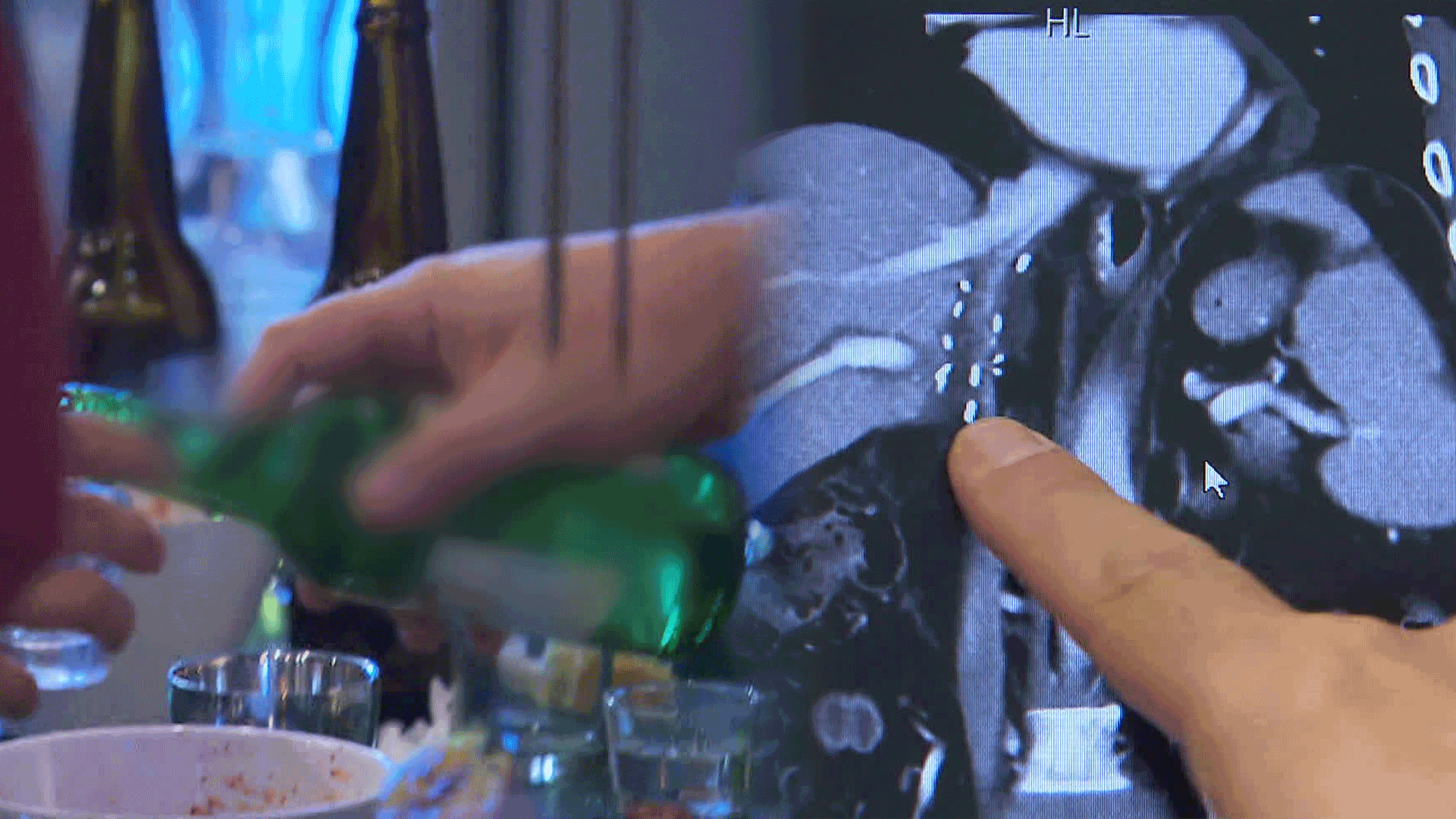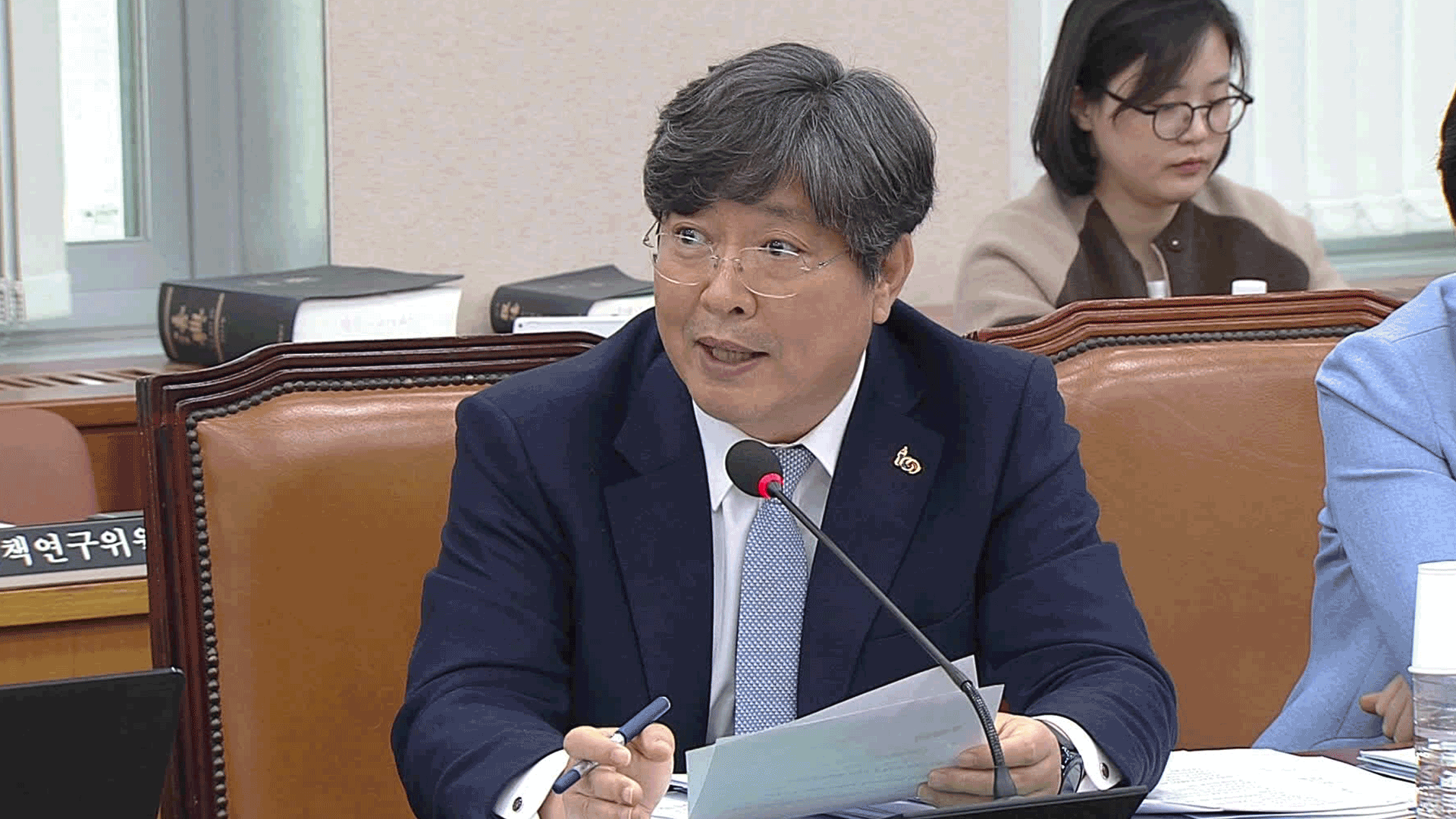[Anchor]
Did you make a New Year's resolution to quit drinking this year?
If you've already given up on that resolution, we have some news that might inspire you to recommit.
Liver cancer, which ranks second in cancer mortality rates in our country, has been found to have significantly different mortality and survival rates depending on drinking habits, according to a study by the National Cancer Center.
Park Kwang-sik reports.
[Report]
A man in his 50s has been drinking 3 to 4 bottles of soju every day for over 30 years.
He developed liver cancer after suffering from cirrhosis and received a liver transplant from his son earlier this year.
[Lee ○○/Liver cancer patient/voice modulation: "I collapsed several times in the bathroom. I vomited and there was blood all over the floor. I was taken to the hospital by ambulance a few times..."]
Liver cancer is the second leading cause of cancer mortality in Korea, and it ranks first among those in their 50s.
In our country, there are many carriers of hepatitis viruses. Combined with widespread heavy drinking that often starts in one's 20s, this leads to a high incidences of liver cancer before old age.
The five-year survival rate is also below 40%, and treatment outcomes remain poor.
[Sung Pil-soo/Professor of Gastroenterology at Seoul St. Mary's Hospital: "There has been no effective treatment to improve the survival rate of patients with advanced liver cancer. Unless a liver transplant is performed, the diseased liver remainsand continues to develop cancer, leading to a high recurrence rate after surgery..."]
The problem is that even after being diagnosed with liver cancer, 1 to 2 out of 10 patients continue to drink alcohol.
A study tracking over 16,000 liver cancer patients for seven years at the National Cancer Center found that those who continued to drink after diagnosis had a mortality rate up to 67% higher than non-drinkers.
This is because alcohol continues to damage liver cells and interferes with treatment effectiveness.
[Kim Bo-hyun/Specialist in Gastroenterology at the National Cancer Center: "If you continue to drink, the damage to liver cells continues, leading to decreased liver function, which in itself can prevent patients from receiving proper treatment for liver cancer."]
A man in his 60s who used to drink 4 to 5 bottles of soju a week.
He quit drinking immediately after liver cancer surgery and has maintained his health without recurrence for over three years.
[Kim ○○/Liver cancer patient/voice modulation: "Giving up a drink I loved wasn't so easy. But so far, there has been no metastases or recurrences. I've become more active."]
In fact, the study showed that regardless of how much a patient drank before diagnosis, quitting drinking after diagnosis has been shown to reduce mortality by 20 to 39%.
The effect of abstaining from alcohol was particularly greater in cases of advanced liver cancer.
[Oh Jin-kyung/Head of Health AI Department at the National Cancer Center: "In the case of terminal-stage cancer patients, quitting drinking after heavy drinking can nearly double their survival rate, which means mortality rates decrease by about half."]
Alcohol is classified as a Group 1 carcinogen by the World Health Organization, and for the survival of liver cancer patients, total abstinence is essential, not just moderation.
This is KBS News, Park Kwang-sik.
Did you make a New Year's resolution to quit drinking this year?
If you've already given up on that resolution, we have some news that might inspire you to recommit.
Liver cancer, which ranks second in cancer mortality rates in our country, has been found to have significantly different mortality and survival rates depending on drinking habits, according to a study by the National Cancer Center.
Park Kwang-sik reports.
[Report]
A man in his 50s has been drinking 3 to 4 bottles of soju every day for over 30 years.
He developed liver cancer after suffering from cirrhosis and received a liver transplant from his son earlier this year.
[Lee ○○/Liver cancer patient/voice modulation: "I collapsed several times in the bathroom. I vomited and there was blood all over the floor. I was taken to the hospital by ambulance a few times..."]
Liver cancer is the second leading cause of cancer mortality in Korea, and it ranks first among those in their 50s.
In our country, there are many carriers of hepatitis viruses. Combined with widespread heavy drinking that often starts in one's 20s, this leads to a high incidences of liver cancer before old age.
The five-year survival rate is also below 40%, and treatment outcomes remain poor.
[Sung Pil-soo/Professor of Gastroenterology at Seoul St. Mary's Hospital: "There has been no effective treatment to improve the survival rate of patients with advanced liver cancer. Unless a liver transplant is performed, the diseased liver remainsand continues to develop cancer, leading to a high recurrence rate after surgery..."]
The problem is that even after being diagnosed with liver cancer, 1 to 2 out of 10 patients continue to drink alcohol.
A study tracking over 16,000 liver cancer patients for seven years at the National Cancer Center found that those who continued to drink after diagnosis had a mortality rate up to 67% higher than non-drinkers.
This is because alcohol continues to damage liver cells and interferes with treatment effectiveness.
[Kim Bo-hyun/Specialist in Gastroenterology at the National Cancer Center: "If you continue to drink, the damage to liver cells continues, leading to decreased liver function, which in itself can prevent patients from receiving proper treatment for liver cancer."]
A man in his 60s who used to drink 4 to 5 bottles of soju a week.
He quit drinking immediately after liver cancer surgery and has maintained his health without recurrence for over three years.
[Kim ○○/Liver cancer patient/voice modulation: "Giving up a drink I loved wasn't so easy. But so far, there has been no metastases or recurrences. I've become more active."]
In fact, the study showed that regardless of how much a patient drank before diagnosis, quitting drinking after diagnosis has been shown to reduce mortality by 20 to 39%.
The effect of abstaining from alcohol was particularly greater in cases of advanced liver cancer.
[Oh Jin-kyung/Head of Health AI Department at the National Cancer Center: "In the case of terminal-stage cancer patients, quitting drinking after heavy drinking can nearly double their survival rate, which means mortality rates decrease by about half."]
Alcohol is classified as a Group 1 carcinogen by the World Health Organization, and for the survival of liver cancer patients, total abstinence is essential, not just moderation.
This is KBS News, Park Kwang-sik.
■ 제보하기
▷ 카카오톡 : 'KBS제보' 검색, 채널 추가
▷ 전화 : 02-781-1234, 4444
▷ 이메일 : kbs1234@kbs.co.kr
▷ 유튜브, 네이버, 카카오에서도 KBS뉴스를 구독해주세요!
- Alcohol worsens liver cancer
-
- 입력 2025-08-04 07:46:32

[Anchor]
Did you make a New Year's resolution to quit drinking this year?
If you've already given up on that resolution, we have some news that might inspire you to recommit.
Liver cancer, which ranks second in cancer mortality rates in our country, has been found to have significantly different mortality and survival rates depending on drinking habits, according to a study by the National Cancer Center.
Park Kwang-sik reports.
[Report]
A man in his 50s has been drinking 3 to 4 bottles of soju every day for over 30 years.
He developed liver cancer after suffering from cirrhosis and received a liver transplant from his son earlier this year.
[Lee ○○/Liver cancer patient/voice modulation: "I collapsed several times in the bathroom. I vomited and there was blood all over the floor. I was taken to the hospital by ambulance a few times..."]
Liver cancer is the second leading cause of cancer mortality in Korea, and it ranks first among those in their 50s.
In our country, there are many carriers of hepatitis viruses. Combined with widespread heavy drinking that often starts in one's 20s, this leads to a high incidences of liver cancer before old age.
The five-year survival rate is also below 40%, and treatment outcomes remain poor.
[Sung Pil-soo/Professor of Gastroenterology at Seoul St. Mary's Hospital: "There has been no effective treatment to improve the survival rate of patients with advanced liver cancer. Unless a liver transplant is performed, the diseased liver remainsand continues to develop cancer, leading to a high recurrence rate after surgery..."]
The problem is that even after being diagnosed with liver cancer, 1 to 2 out of 10 patients continue to drink alcohol.
A study tracking over 16,000 liver cancer patients for seven years at the National Cancer Center found that those who continued to drink after diagnosis had a mortality rate up to 67% higher than non-drinkers.
This is because alcohol continues to damage liver cells and interferes with treatment effectiveness.
[Kim Bo-hyun/Specialist in Gastroenterology at the National Cancer Center: "If you continue to drink, the damage to liver cells continues, leading to decreased liver function, which in itself can prevent patients from receiving proper treatment for liver cancer."]
A man in his 60s who used to drink 4 to 5 bottles of soju a week.
He quit drinking immediately after liver cancer surgery and has maintained his health without recurrence for over three years.
[Kim ○○/Liver cancer patient/voice modulation: "Giving up a drink I loved wasn't so easy. But so far, there has been no metastases or recurrences. I've become more active."]
In fact, the study showed that regardless of how much a patient drank before diagnosis, quitting drinking after diagnosis has been shown to reduce mortality by 20 to 39%.
The effect of abstaining from alcohol was particularly greater in cases of advanced liver cancer.
[Oh Jin-kyung/Head of Health AI Department at the National Cancer Center: "In the case of terminal-stage cancer patients, quitting drinking after heavy drinking can nearly double their survival rate, which means mortality rates decrease by about half."]
Alcohol is classified as a Group 1 carcinogen by the World Health Organization, and for the survival of liver cancer patients, total abstinence is essential, not just moderation.
This is KBS News, Park Kwang-sik.
Did you make a New Year's resolution to quit drinking this year?
If you've already given up on that resolution, we have some news that might inspire you to recommit.
Liver cancer, which ranks second in cancer mortality rates in our country, has been found to have significantly different mortality and survival rates depending on drinking habits, according to a study by the National Cancer Center.
Park Kwang-sik reports.
[Report]
A man in his 50s has been drinking 3 to 4 bottles of soju every day for over 30 years.
He developed liver cancer after suffering from cirrhosis and received a liver transplant from his son earlier this year.
[Lee ○○/Liver cancer patient/voice modulation: "I collapsed several times in the bathroom. I vomited and there was blood all over the floor. I was taken to the hospital by ambulance a few times..."]
Liver cancer is the second leading cause of cancer mortality in Korea, and it ranks first among those in their 50s.
In our country, there are many carriers of hepatitis viruses. Combined with widespread heavy drinking that often starts in one's 20s, this leads to a high incidences of liver cancer before old age.
The five-year survival rate is also below 40%, and treatment outcomes remain poor.
[Sung Pil-soo/Professor of Gastroenterology at Seoul St. Mary's Hospital: "There has been no effective treatment to improve the survival rate of patients with advanced liver cancer. Unless a liver transplant is performed, the diseased liver remainsand continues to develop cancer, leading to a high recurrence rate after surgery..."]
The problem is that even after being diagnosed with liver cancer, 1 to 2 out of 10 patients continue to drink alcohol.
A study tracking over 16,000 liver cancer patients for seven years at the National Cancer Center found that those who continued to drink after diagnosis had a mortality rate up to 67% higher than non-drinkers.
This is because alcohol continues to damage liver cells and interferes with treatment effectiveness.
[Kim Bo-hyun/Specialist in Gastroenterology at the National Cancer Center: "If you continue to drink, the damage to liver cells continues, leading to decreased liver function, which in itself can prevent patients from receiving proper treatment for liver cancer."]
A man in his 60s who used to drink 4 to 5 bottles of soju a week.
He quit drinking immediately after liver cancer surgery and has maintained his health without recurrence for over three years.
[Kim ○○/Liver cancer patient/voice modulation: "Giving up a drink I loved wasn't so easy. But so far, there has been no metastases or recurrences. I've become more active."]
In fact, the study showed that regardless of how much a patient drank before diagnosis, quitting drinking after diagnosis has been shown to reduce mortality by 20 to 39%.
The effect of abstaining from alcohol was particularly greater in cases of advanced liver cancer.
[Oh Jin-kyung/Head of Health AI Department at the National Cancer Center: "In the case of terminal-stage cancer patients, quitting drinking after heavy drinking can nearly double their survival rate, which means mortality rates decrease by about half."]
Alcohol is classified as a Group 1 carcinogen by the World Health Organization, and for the survival of liver cancer patients, total abstinence is essential, not just moderation.
This is KBS News, Park Kwang-sik.
-
-

박광식 기자 doctor@kbs.co.kr
박광식 기자의 기사 모음
-
이 기사가 좋으셨다면
-
좋아요
0
-
응원해요
0
-
후속 원해요
0















이 기사에 대한 의견을 남겨주세요.